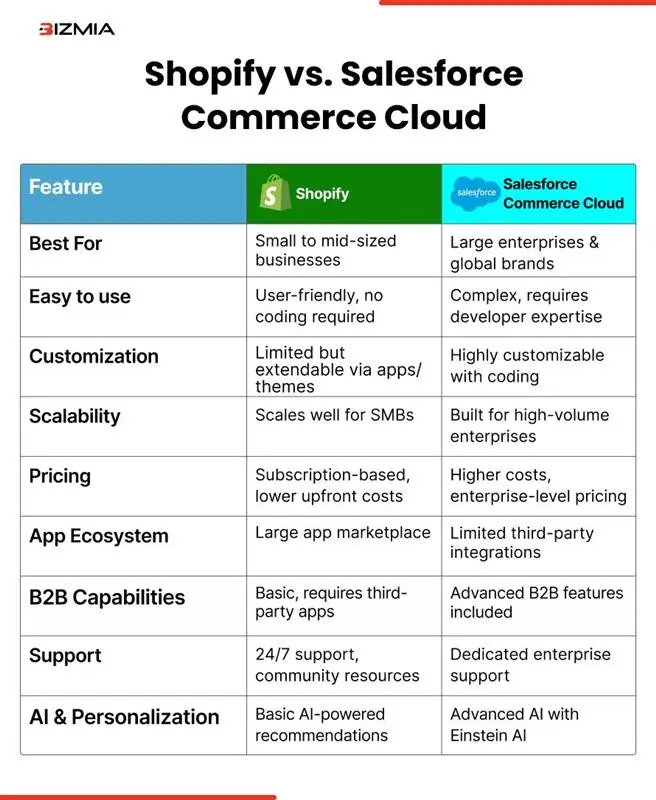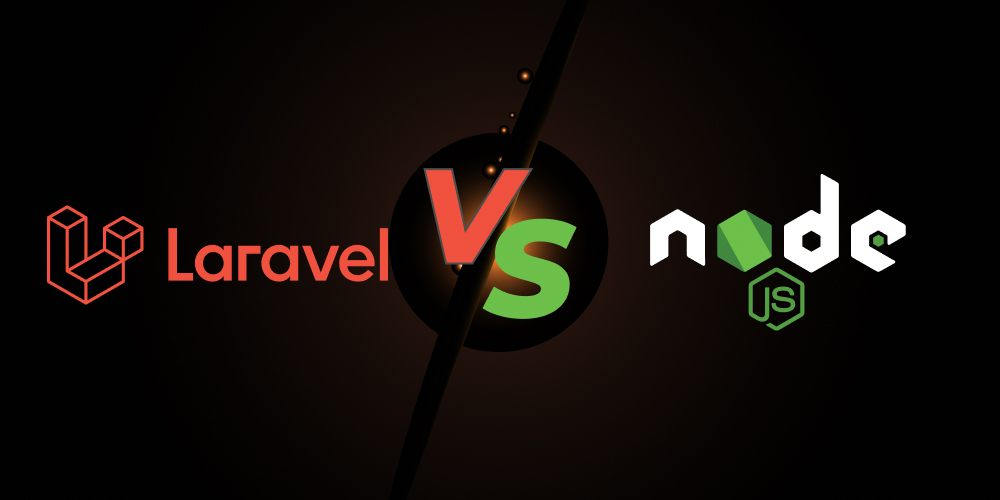When it comes to choosing an e-commerce platform, the debate of Shopify vs Salesforce—or more specifically Shopify Plus vs Salesforce Commerce Cloud—is one that goes way back. But are you team Shopify or team Salesforce? The only way to find out is by coming along as we break down their features, pricing and development costs to give you a comprehensive look into whose side your business will thrive on.
Shopify vs Salesforce Commerce Cloud
Out of all the e-commerce platforms out there, Salesforce Commerce Cloud (SFCC) has been traditionally catering to some of the bigger and more global enterprises (think Amazon, Emirates, and Kroeger), while Shopify has been proven to be the popular choice for small-to-medium-sized businesses (think Gymshark, Allbirds and Bombas).
But with each platform bringing newer features and enhancements to the game, which is the right one for your business? Read on to find out just what might appeal to you and your business in the great Shopify vs Salesforce debate.
Here is an infographic to help you understand it better:

What is Shopify?
Shopify is a popular subscription-based eCommerce platform, known for its ease of use and quick setup time. Perfect for small businesses launching their first store and SMBs looking to expand, Shopify makes it simple to create, manage, and grow an online business mainly relying on a massive ecosystem of third-party apps and integrations. So, SMBs and fairly-large businesses use Shopify when they need to add custom features, automate tasks, and track sales performance without the need for technical expertise.
Another reason why small businesses and SMBs are so keen on Shopify is because of its multi-channel selling tool. They increase their reach by listing products on Amazon, eBay, Instagram—you name it. It’s the potential for scalability that attracts these businesses to Shopify.
If they need to go a step further, Shopify Plus features get them custom checkouts, automation tools and API access. As a result, the Shopify development cost also goes down, making it even more attractive than its competitors. To fully unlock these benefits and maximize your store’s potential, it’s always smart to hire Shopify Plus developer who can customize and optimize your store for long-term success.
What is Salesforce Commerce Cloud?
Salesforce Commerce Cloud is a cloud-based eCommerce platform which also has a closed ecosystem, meaning businesses have to rely on SFCC’s native features instead of any third-parties to customize their stores.
But to compensate for the need of technical expertise, Salesforce Commerce Cloud features include: AI-powered personalization, order management, multi-store setup, visual merchandising functionality and native support for bundled products; making it more of an all-in-one platform rather than relying on third parties as their tech stack.
This is in part due to SFCC’s architecture which is designed and built to scale up and cater for significant peaks in demand, making it the popular choice for bigger, more global enterprises to date.
Shopify Plus vs Salesforce Commerce Cloud: The Details
Choosing between Shopify vs Salesforce or Shopify Plus vs Salesforce Commerce Cloud depends on your business size and requirements—and let’s not forget your budget as well.
Shopify Plus is ideal for growing businesses that need an affordable, scalable, and easy-to-use platform. Better known for serving brands like Fashion Nova, Steve Madden and the Red Bull Shop, Shopify helps these businesses scale gradually and affordably.
On the other hand, Salesforce Commerce Cloud is best suited for large enterprises that require advanced AI-driven personalization and deep CRM integration. Global names like Adidas, Unilever and L’Oréal all rely on SFCC’s tools and e-commerce strategies to scale and grow. `
So, for businesses looking for a quicker setup with cheaper development costs, Shopify Plus is the better option. But if yours is an enterprise that is in need of sophisticated commerce solutions with laser-focus on data-driven insights, Salesforce Commerce Cloud is the choice for you.
Let’s take a better look at just what each platform brings to the table to help you get a better idea of what to expect when you pick a side in the Shopify vs Salesforce debate.
Shopify Plus Features
- Fully hosted SaaS platform
- Customizable checkout experience
- Multi-channel selling (Amazon, eBay, Instagram, Facebook, etc.)
- 24/7 dedicated support
- Automated workflows with Shopify Flow
- Unlimited staff accounts
- Advanced security and compliance
Salesforce Commerce Cloud Features
- AI-powered personalization with Einstein AI
- Seamless omnichannel experience
- Robust order management system
- Scalability for global businesses
- Strong integration with CRM and marketing automation tools
- Advanced merchandising and predictive analytics
Customization: Flexibility vs. Control
When it comes to customization, Salesforce Commerce Cloud offers more flexibility in that department. Businesses can create multiple storefronts, customize checkout flows, and set up international shipping fields, making it an excellent choice for global brands that are heavy on the brand identity.
To top that off, Salesforce Commerce Cloud provides advanced product attribution and catalog management, which is ideal for large businesses managing complex inventories and multiple catalogs.
Shopify prioritizes ease of use instead. With pre-designed templates and quick customization options, the platform is known to focus on streamlining setups to cater to fledgling businesses.
But this limits design flexibility. Shopify updates are instantly reflected in the live store, which is convenient but can be risky if errors occur and a technical team isn’t part of the budget. Salesforce Commerce Cloud, in contrast, implements a series of checks before publishing changes, ensuring a more controlled workflow.
Benefits of Salesforce Commerce Cloud include personalized marketing campaigns. Shopify also supports marketing features, but they often require third-party plugins that are part of Shopify packages.
If you need deep customization and personalized marketing, Salesforce Commerce Cloud is the better choice. However, if you want a more intuitive, plug-and-play solution, Shopify is the way to go.
Integration: App Market vs. Enterprise Connectivity
One of the main benefits of Shopify Plus and other Shopify features is the vast plugin marketplace. Tools like QuickBooks, Zapier, and MailChimp are all at your disposal depending on what tier of Shopify pricing suits your business.
The only potential drawback of this is that adding multiple plugins can slow down site performance, especially if they are not optimized.
Salesforce Commerce Cloud can then come to the rescue, since part of Salesforce Digital 360 is to provide seamless integration with enterprise systems. It offers built-in support for CRM, order management, and analytics, allowing businesses to manage everything from a single platform.
Additionally, Salesforce’s partnership with Stripe simplifies payment processing, and its MuleSoft Accelerator makes it easier to connect with SAP, Jira, and ServiceNow without coding. All this, of course, comes at a slightly higher Salesforce Commerce Cloud development cost compared to the more straight-forward and budget-friendly Shopify development cost.
So, where Shopify offers more third-party integrations, Salesforce Commerce Cloud provides a more secure and scalable solution for enterprises needing advanced system connectivity.
Ease of Use: Shopify’s Simplicity vs. Salesforce’s Complexity
Shopify is known for its user-friendly interface, allowing businesses to set up an online store quickly without coding experience. Its drag-and-drop functionality and pre-built themes make it a great option for beginners. However, customization is limited, meaning many stores look similar, meaning a Shopify store is easier to spot than a Salesforce one.
Salesforce Commerce Cloud requires developer expertise, driving up its Salesforce Commerce Cloud development cost—but it offers superior flexibility and product management.
While it may take more effort to set up, once the system is in place, sales teams can easily manage inventory, promotions, and customer experiences, letting businesses in on the many benefits of Salesforce Commerce Cloud.
So, where Shopify is perfect for businesses that want a simple, quick-launch platform, making it one of the main Benefits of Shopify Plus, Salesforce Commerce Cloud is better for enterprises willing to invest in a custom, highly scalable solution.
Benefits of Shopify Plus vs Benefits of Salesforce Commerce Cloud
Benefits of Shopify Plus
- Easy to set up and use
- Lower upfront development costs
- Seamless integrations with third-party apps
- Faster time to market
- Extensive theme and plugin ecosystem
- Scalable pricing based on business growth
Benefits of Salesforce Commerce Cloud
- AI-driven recommendations improve customer experience
- Powerful B2B and B2C commerce capabilities
- Enterprise-level security and compliance
- Deep integration with Salesforce CRM for advanced analytics
High customization options
But which one will benefit your business? Now that you’ve got a clear-cut idea of what to expect when you use either platform, let’s dive into the final part of the decision-making: money matters.
Shopify Pricing vs Salesforce Commerce Cloud Pricing
While the Shopify vs Salesforce debate is swirling over your head, only two things remain that can tip the scales and finally draw out a decision for you: your budget.
Whether you prefer the Benefits of Shopify Plus or the Benefits of Salesforce Commerce Cloud, they both strive—in essence—to accomplish maintaining, scaling and growing your business online. So, it all comes down to what pricing works for you. Read on to find out the pricing and development costs for each platform that’s just right for your wallet.
Shopify pricing covers multiple plans: Basic Shopify for $39/month, Shopify for $105/month, Advanced Shopify for $399/month and Shopify Plus which Starts at $2,000/month (with custom pricing also available).
Salesforce Commerce Cloud pricing follows a revenue-based pricing model, so the overall costs vary depending on your business size and sales volume. Typically, it charges a percentage of gross merchandise value (GMV), making it ideal for larger businesses and global enterprises but not too easy on the wallet for new and smaller businesses.
So if you’re the owner of a brand-new business looking to establish itself online, one of the Shopify packages might be the perfect match for you.
Shopify Development Cost vs Salesforce Commerce Cloud Development Cost
The Shopify development cost also covers tiers: you have the Basic setup for around $500 – $5,000; Custom development for $10,000 – $50,000; and App and plugin integrations in the $500 – $5,000 range.
Looking at its rival, the Salesforce Commerce Cloud development cost includes an Initial setup of $50,000 – $250,000; Custom development which can be $100,000+ and lastly, advanced integrations for around $20,000 – $100,000.
Depending on what resources you’re able to put away for the online presence of your business, there are some key considerations to think about before jumping the gun on one of these platforms. SFCC has a much higher upfront, initial setup cost whereas the Shopify development cost is more inexpensive.
But keep in mind that if you use SFCC, there’s a very slim chance that you’ll need to spend money on advanced integrations as the core platform is more than enough for your customization needs. The total Salesforce Commerce Cloud Development Cost can therefore be expected to be around $50,000-$250,000 while the total Shopify Development Cost will most likely include all levels.
Final Verdict: Which Platform Should You Choose?
In a nutshell, who’s the winner in the Shopify v Salesforce debate? By evaluating your budget, business goals, and long-term needs, you can decide whether Shopify or Salesforce Commerce Cloud is the right fit for your online store.
Shopify Plus is the more suitable choice for small to medium-sized businesses seeking a balance of affordability, ease of use, and scalability. If yours is an SMB looking for gradual growth, Shopify Plus will have you covered. In comparison, Salesforce Commerce Cloud is better for global businesses and enterprises that need more advanced tools for their growth. So, SFCC’s AI-driven insights and ability to handle complex, high-volume transactions make it the more popular choice for bigger brand names and those businesses wanting to reach a more global audience.
Frequently Asked Questions
Is Shopify better for small businesses in 2025?
Shopify remains one of the best platforms for small businesses in 2025 due to its ease of use, affordability, and scalability. It offers a wide range of customizable themes, built-in payment options, and an intuitive dashboard, making it ideal for startups and growing businesses. With improved AI-driven analytics, automation tools, and third-party app integrations, Shopify simplifies store management. Its flexible pricing plans and low initial costs make it accessible to businesses of all sizes. While competitors offer enterprise-level solutions, Shopify continues to be a top choice for small businesses seeking a user-friendly, cost-effective, and feature-rich eCommerce solution.
How does Shopify work?
Shopify is a cloud-based eCommerce platform that allows businesses to create, customize, and manage online stores. Users can select from a variety of themes, add products, set up payment and shipping options, and start selling quickly. Shopify handles hosting, security, and software updates, eliminating the need for technical expertise.
The platform supports integrations with third-party apps for marketing, inventory management, and analytics. It also provides built-in SEO features, social media selling options, and multichannel capabilities. Whether selling physical products, digital goods, or subscriptions, Shopify offers an all-in-one solution for businesses to operate and scale their online presence.
What are the best online store platforms?
The best online store platforms in 2025 include Shopify, WooCommerce, BigCommerce, and Magento. Shopify is known for its ease of use and scalability, making it ideal for small to mid-sized businesses. WooCommerce, a WordPress plugin, is highly customizable but requires more technical expertise. BigCommerce offers advanced built-in features for scaling enterprises, while Magento is a powerful open-source solution suited for large businesses with development resources.
The choice depends on factors such as budget, customization needs, scalability, and technical expertise. For most users, Shopify remains the top pick due to its simplicity, reliability, and extensive app ecosystem.












